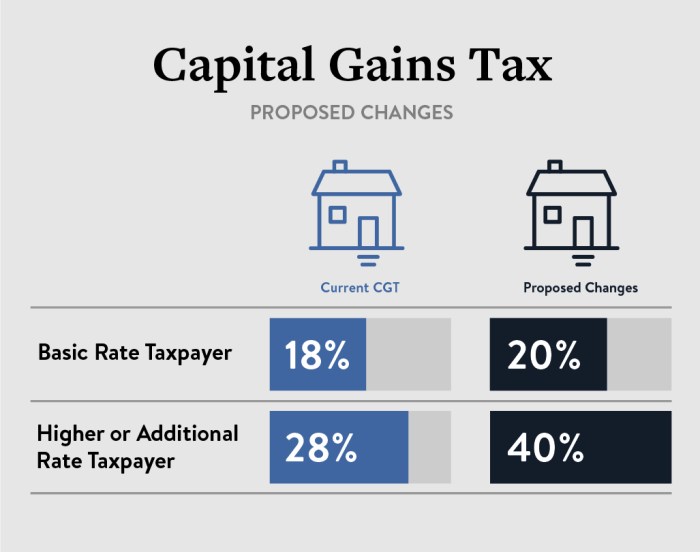Get ready to dive into the world of capital gains tax, where financial jargon meets real-world impact. Brace yourself for a rollercoaster of insights and strategies that will change your perspective on taxes forever.
Capital gains tax is a crucial element of the financial landscape, affecting individuals and businesses in ways that go beyond the numbers on a balance sheet.
Definition of Capital Gains Tax
Capital gains tax is a tax levied on the profits made from the sale of capital assets such as stocks, bonds, real estate, and other investments. It is important to note that capital gains tax is different from other types of taxes like income tax because it is specifically targeted at the increase in value of these assets.
Assets Subject to Capital Gains Tax
- Stocks and bonds
- Real estate properties
- Collectibles such as art and antiques
- Business interests
Calculation and Impact of Capital Gains Tax
Capital gains tax is calculated based on the difference between the purchase price and the selling price of the asset. The tax rate applied depends on how long the asset was held before being sold. Short-term capital gains (assets held for less than a year) are taxed at higher rates than long-term capital gains (assets held for more than a year).
For individuals, capital gains tax can impact the after-tax return on investments and influence investment decisions. For businesses, it can affect the overall profitability and financial planning strategies.
Importance of Capital Gains Tax
Capital gains tax plays a crucial role in a country’s economy by generating revenue for the government and influencing investment decisions.
Promoting Fairness in the Tax System
Capital gains tax promotes fairness in the tax system by ensuring that individuals who earn income from selling assets pay their fair share of taxes. This helps in reducing income inequality and ensures that everyone contributes to the country’s financial stability.
Influencing Investment Decisions
Capital gains tax influences investment decisions by impacting the after-tax return on investments. Investors are more likely to consider the tax implications when deciding whether to buy, sell, or hold onto assets. This can lead to more efficient allocation of resources and encourage long-term investments that benefit the economy as a whole.
Capital Gains Tax Rates
When it comes to capital gains tax rates, it’s essential to understand the differences between short-term and long-term investments. Short-term investments are typically held for a year or less, while long-term investments are held for more than a year. The tax rates for these two types of investments vary.
Short-Term vs. Long-Term Capital Gains Tax Rates
Short-term capital gains tax rates are usually taxed at ordinary income tax rates, which can range from 10% to 37% in the United States. On the other hand, long-term capital gains tax rates are generally lower and can range from 0% to 20%, depending on your income level.
Comparison of Capital Gains Tax Rates Across Different Countries
When comparing capital gains tax rates between different countries, you’ll find that rates vary significantly. For example, the United States has a progressive tax system for capital gains, while some countries have a flat rate for all capital gains. Understanding these differences can help investors make informed decisions when investing internationally.
Impact of Changes in Capital Gains Tax Rates on Investment Behaviors
Changes in capital gains tax rates can have a significant impact on investment behaviors. For instance, if tax rates increase, investors may be less inclined to sell their investments, leading to less liquidity in the market. Conversely, lower tax rates may encourage more selling activity as investors seek to take advantage of reduced tax liabilities.
Strategies to Minimize Capital Gains Tax
When it comes to minimizing capital gains tax, there are several tax-efficient investment strategies that can help reduce your tax liability. Let’s explore some of these strategies below.
Tax-Loss Harvesting
Tax-loss harvesting is a method used to offset capital gains by selling investments that have experienced a loss. By realizing these losses, you can offset your capital gains and reduce your overall tax burden. It’s important to note that there are specific rules and guidelines around tax-loss harvesting, so it’s advisable to consult with a tax professional before implementing this strategy.
Tax-Deferred Accounts
Another effective way to reduce capital gains tax is by utilizing tax-deferred accounts such as a 401(k) or an IRA. By contributing to these accounts, you can defer taxes on your investment gains until you withdraw the funds in retirement. This can help lower your current tax liability and allow your investments to grow tax-free until you start making withdrawals.
Capital Gains Tax Exemptions and Deductions

When it comes to reducing your capital gains tax bill, taking advantage of exemptions and deductions can be key. Let’s explore some common ways to lower your tax liability.
Primary Residence Exemption
Selling your primary residence can often be exempt from capital gains tax. If you’ve lived in the home for at least two of the past five years, you may qualify for up to $250,000 (or $500,000 for married couples) in tax-free gains. This can be a significant tax-saving opportunity for homeowners looking to downsize or relocate.
Indexation and Impact on Capital Gains Tax
Indexation is a method used to adjust the cost basis of an asset for inflation, reducing the taxable gain when the asset is sold. By accounting for inflation, indexation can lower the overall capital gains tax liability. This can be particularly beneficial for assets held over the long term, where inflation has eroded the real value of the initial investment.
